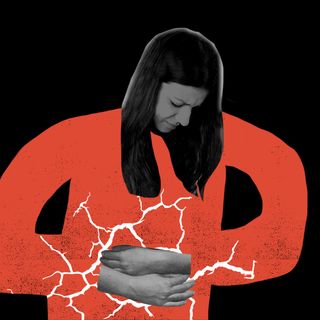
Why Meditation Works For Some People, But Not Others
Despite being a practice hailed by many, meditation can, indeed, trigger adverse effects, including depression and anxiety, in some people.

I’ve had the privilege to be open about my struggles with mental health. But, sometimes, it makes me a magnet for unsolicited advice from people who tell me meditation is the answer to all my woes — depression, anxiety, PMDD, et al. Even my autism and ADHD, according to them, can be “cured” if only I had the attention span to sit uninterrupted, in a trance, for a few minutes every day — never mind that it is not my neurodivergence per se that has prompted my mental health disorders, but instead, society’s refusal to accept or accommodate my neurodivergence that, ironically, manifests in the form of advice like this.
But the experience of meditation can be distressing for autistic and ADHD individuals who process sensory stimuli differently, as Jaime A. Heidel, an autistic writer, notes. The silence and stillness that the traditional practice of meditation calls for can, in fact, overwhelm them because the sounds, textures, and other stimuli suddenly feel more pronounced to them, triggering a sense of discomfort and agitation. Research, in fact, connects this sensory oversensitivity that neurodivergent people are prone to, to the anxiety they experience. So, rather than alleviating the anxiety of a neurodivergent individual, meditation can, on occasion, amplify it. Further, due to their challenges with regulating their attention, living with ADHD may also lead one to struggle with meditation practices that hinge on sustained attention to one’s breath or bodily sensations.
Research also suggests that some people — including those who are neurotypical — may report a fear of losing control, coupled with a rise in intrusive thoughts and symptoms of anxiety, while practicing relaxation techniques that would enable them to meditate. A study focusing on individuals living with PTSD, too, noted a “negative correlation between anxiety sensitivity [or a fear of anxiety and anxiety-related sensations, which tends to be elevated among people with PTSD] and mindfulness.” It is also possible that the sense of vulnerability that can accompany a meditation session — often, as a result of being instructed to intentionally relax one’s body — can exacerbate one’s fear or panic.
As David Treleaven, the author of Trauma-Sensitive Mindfulness: Practices for Safe and Transformative Healing, told Mashable, “[F]or some people struggling with trauma the basic tenets of mindful meditation practice, including focusing on the breath and remaining still for periods of time, can actually exacerbate trauma symptoms. Paying close attention to anxious or threatening feelings may heighten the body’s fight-or-flight stress response, elicit intrusive thoughts of harm or danger, and prompt flashbacks to traumatic events.
Related on The Swaddle:
Why Mindfulness During Sex Is Linked to Greater Satisfaction, More Orgasms
“In 1977, the American Psychiatric Association published a statement recommending that research on meditation should evaluate both its usefulness and its dangers. And ancient meditation manuals, like the Buddhist Dharmatrāta Meditation Scripture, likewise indicate that if meditation is not carried out properly, the mind can become unstable, restless, or confused,” Miguel Farias, an experimental psychologist specializing in research surrounding beliefs and spiritual practices, including meditation, wrote in BBC Science Focus. Yet, as researchers have noted, it has taken decades to even acknowledge that we might be nurturing biases that prompt us to exaggerate the clinical benefits of meditation practice while dismissing the fact it might have an adverse impact on some people — lying even to ourselves, in the process.
In 2020, Farias led a meta-analysis of 83 studies — conducted between 1975 and 2019, with a total of 6,703 participants — which indicated that despite being a practice hailed by many, meditation and mindfulness can, indeed, trigger adverse effects, including depression and anxiety, in some people. The most common among these were: anxiety, reported in 33% of the studies; depression, in 27%; cognitive anomalies in 25%; and gastrointestinal problems and suicidal behaviors, which were the least frequent, in 11%. “For most people [meditation] works fine, but it has undoubtedly been overhyped, and it’s not universally benevolent… People have experienced anything from an increase in anxiety up to panic attacks,” Farias told New Scientist.
Research focusing on the effectiveness of meditation on ADHD brains has also noted that the practice doesn’t completely do away with the impact of the condition on their lives, calling for further studies to explore how meditation and mindfulness techniques can accommodate neurodivergent brains. But developments on that front have, so far, been scarce.
“Many of us feel ashamed because we think meditation doesn’t work for us,” writes Catherine Dean, who was diagnosed with ADHD as an adult. “I thought you had to completely empty your mind, [but] as people, we all access our senses in different ways… [M]y partner needs to touch things to feel a connection, whereas I respond strongly to smells and sight… Once you have determined which senses are more neglected for you, ask yourself why. Not from a place of shame, but from a place of curiosity. The next time I went to meditate, I used extra soft clothing and blankets around me, and I noticed how open my body reacted to a different experience.”
Related on The Swaddle:
Why People Living With ADHD Are Often Misjudged As ‘Lazy’
But given the lack of research on how neurodivergence can present differently in different people, and impact their lives in myriad ways, it is hardly surprising that awareness of meditation techniques suited for neurodivergent people — like movement-based mindfulness practices, for instance — is largely absent from the discourse.
In essence, while meditation does unlock a plethora of benefits for many individuals, it’s important to acknowledge that it may not be effective for everyone. As our understanding of neurodiversity continues to grow, it’s essential that we work to develop mindfulness practices that are inclusive of the diversity of the human mind.
Without that, implying that one’s inability to heal from the mental health disorders that they struggle with can be traced back to them not meditating enough — as many godmen in India, alongside well-intentioned neighbors, are wont to do — serves merely to invalidate the aforementioned struggles. And as we know, invalidation of one’s pain only propels them deeper down the cesspit of depression. Also, not everyone enjoys unsolicited advice — often, because it can induce stress, too.
So, if you were planning to pull any stunts à la Sri Sri Ravishankar — who touted meditation as the “long-term cure” for depression in the wake of celebrated comedian and actor Robin Williams’ death by suicide in 2014, stating that the “perennial disorder affecting most western countries can be overcome by spirituality” — well, don’t.
Devrupa Rakshit is an Associate Editor at The Swaddle. She is a lawyer by education, a poet by accident, a painter by shaukh, and autistic by birth. You can find her on Instagram @devruparakshit.
Related


The Popularity of ‘Emotional Eating’ Begs the Question: Why Do People Use Food to Cope With Stress?
